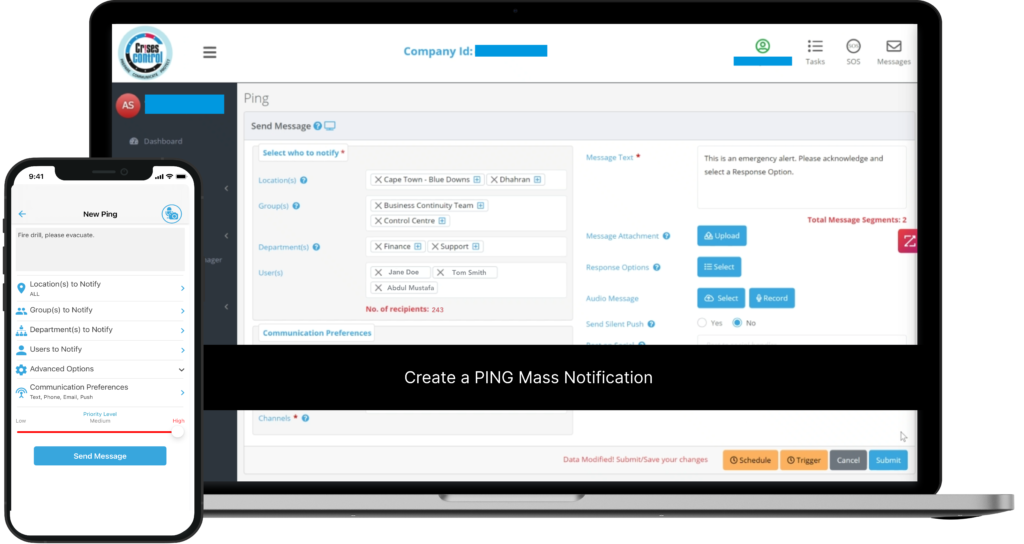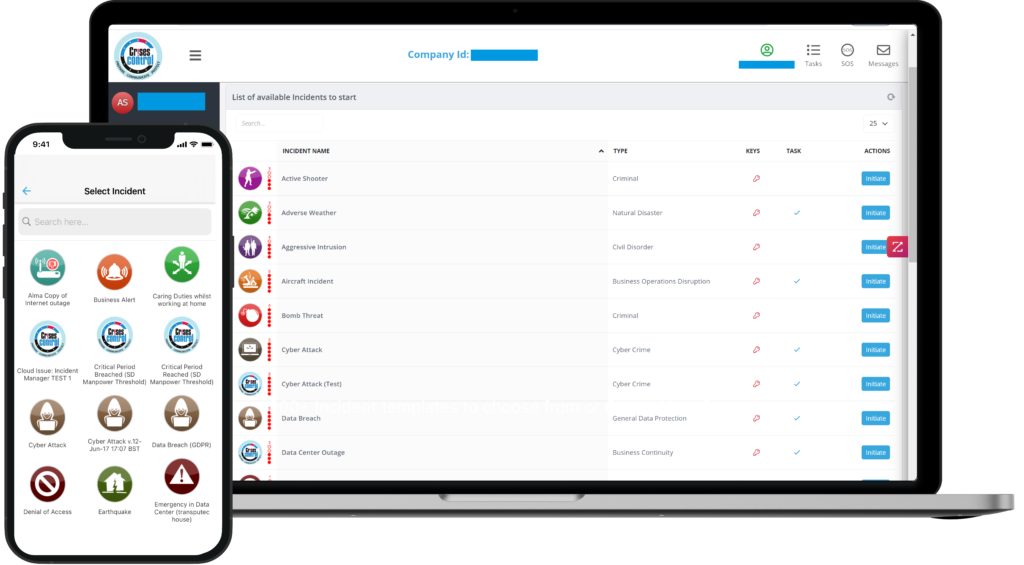Written by Sonny Sehgal | Board Member
Effective crisis management relies heavily on quick and reliable communication. Organisations are often faced with unexpected emergencies that can disrupt operations and pose risks to safety. While platforms like AlertMedia offer essential mass notification capabilities, they may not fully meet the diverse needs of organisations during crises. This is where Crises Control steps in as a robust AlertMedia alternative, providing a comprehensive solution that goes beyond mere notifications. By seamlessly integrating emergency communication with robust incident management features, Crises Control ensures that organisations are not just alerting stakeholders, but are also prepared to respond effectively throughout the entire crisis lifecycle.
Why Choose Crises Control?
When it comes to selecting a crisis management tool, it’s vital to understand the strengths and weaknesses of each option. AlertMedia excels in providing mass notification services that can be effective in certain situations. However, Crises Control stands out by offering a holistic approach that streamlines the entire process from notification to resolution. Let’s explore how Crises Control enhances emergency communication and crisis management while addressing common challenges organisations face during crises.
1. Comprehensive Mass Notification
The Need for Effective Alerts
During emergencies, organisations often grapple with miscommunication and delayed responses. Imagine a scenario where a fire alarm goes off in a large office building. If the notification is not delivered promptly or clearly, chaos can ensue. Employees may not know whether to evacuate or stay put, leading to confusion and panic. A well-timed message can make all the difference when lives and assets are at stake.
Crises Control elevates this functionality through its multi-channel communication approach, ensuring that critical information reaches everyone promptly.
Multi-Channel Communication
Crises Control allows organisations to send Ping Mass Notification alerts through various channels—SMS, email, voice calls, and push notifications. This ensures that messages reach all stakeholders, regardless of their location or preferred communication method. By covering multiple channels, Crises Control helps eliminate the risk of missed notifications—a common challenge that can hinder effective crisis management.
For example, if a severe weather warning is issued, Crises Control can notify employees via text while also sending an email and making a phone call to ensure everyone is informed and aware of the situation.
Customisation of Alerts
Customisation is another crucial feature that sets Crises Control apart. Users can tailor notifications based on the incident type, audience, and urgency. This personalisation is vital for ensuring that all stakeholders receive relevant information, enhancing the effectiveness of communication.
Imagine a situation where a building evacuation is necessary due to a gas leak. Crises Control can send targeted alerts to specific teams or departments, informing them of the situation and instructing them on the safest exit routes. By providing clear, actionable instructions, Crises Control addresses the challenge of confusion during crises, ensuring that everyone understands the situation and their required actions.
Interested in our Ping Mass Notification Software?
Efficiently alert everyone in seconds at scale with our Mass Notification System – PING, get the message out fast and ensure rapid response and recovery.

2. Seamless Transition to Incident Management
Beyond Notifications: The Need for Action
The true test of a crisis management platform lies in its ability to facilitate a smooth transition from alerts to actionable responses. Crises Control addresses this need by integrating incident management directly into its platform, combating the issue of slow response times.
Imagine the aftermath of an emergency alert—what happens next? It’s not enough to simply notify people; organisations must act quickly and effectively.
Integrated Incident Management
Through its Incident Manager Module, the platform allows teams to create structured workflows that facilitate the management of various situations. This includes the ability to assign roles and responsibilities to team members based on the specific incident type.
For instance, in the event of an active shooter situation, while the platform can notify employees and initiate a response, it also empowers designated personnel to carry out critical actions—such as contacting law enforcement, organising evacuation procedures, or administering first aid. This structured approach ensures that all team members are aware of their responsibilities, reducing the time needed to mobilise resources and respond effectively to the incident.
By streamlining this transition from alert to action, Crises Control enhances coordination and effectiveness during crises, addressing common challenges faced by organisations when responding to emergencies.
Task Assignments and Real-Time Monitoring
Through the Task Manager feature, organisations can assign specific responsibilities to team members based on their roles and the nature of the incident. Real-time monitoring allows crisis managers to track the progress of these tasks, providing transparency and accountability throughout the response.
This comprehensive approach expedites resolution while minimising the risk of miscommunication, which is a significant challenge during emergencies. For example, if one team member is responsible for contacting the media while another handles the emergency services, Crises Control ensures that both teams are updated with the latest information in real time, allowing them to coordinate their actions effectively.
3. Incident Planning and Preparation
Proactive Crisis Management
Effective crisis management requires proactive planning. Unfortunately, many organisations fail to prepare adequately, which can lead to chaos during actual events.
Crises Control’s Incident Plan Builder empowers organisations to prepare for potential emergencies by choosing from over 200 pre-defined templates or by creating their own tailored incident response plans, addressing the need for readiness.
For example, if a company anticipates a cyber-attack, they can create a specific response plan outlining steps to secure data, notify affected clients, and restore services. By eliminating uncertainty, Crises Control tackles one of the main pain points organisations face during crises.
Realistic Scenarios and Training
Additionally, Crises Control offers Crisis War Gaming for conducting training exercises based on realistic scenarios. These exercises help teams familiarise themselves with their roles and the system, building confidence and readiness for actual emergencies.
Consider a hospital that regularly conducts drills on how to handle mass casualty incidents. Using Crises Control, they can simulate a real-life emergency, allowing staff to practise their roles in a safe environment. This proactive approach is a significant asset in enhancing overall preparedness and addressing the challenge of unpreparedness during crises.

Interested in our Incident Management Software?
Customise your Crisis Incident Management Software to meet your specific needs with our flexible tools & stay connected and informed during the crisis and incident management process
4. Post-Incident Auditing and Continuous Improvement
Learning from Crises
Once the immediate crisis has been resolved, the focus should shift to learning and improvement. Post-incident auditing is essential for identifying what worked well and what could be improved for future responses. Organisations often overlook this step, leading to repeated mistakes.
Crises Control’s Reporting and Auditing Features excel in this area, automatically generating detailed reports after each incident. These reports include data on response times, task completion, and overall effectiveness, allowing organisations to analyse their performance critically.
Continuous Improvement Cycle
This continuous improvement cycle enables businesses to refine their incident response strategies, enhancing preparedness for future crises. For instance, if a report reveals that response times lagged during a specific type of incident, the organisation can adjust its training or procedures to address this weakness.
Take the case of a manufacturing plant that experiences a chemical spill. After the incident, they review the report generated by Crises Control and discover that communication delays occurred during the initial response. By identifying these gaps, they can implement new protocols to streamline communication for future incidents, ultimately improving their overall response capability.
5. Ensuring Business Continuity
The Importance of Business Continuity
In today’s unpredictable environment, ensuring business continuity is more crucial than ever. Organisations must not only manage crises effectively, but also return to normal operations as swiftly as possible.
Crises Control’s comprehensive platform supports this goal through its integrated features, tackling the challenge of prolonged disruptions.
Robust Recovery Plans
Crises Control facilitates the development of robust recovery plans that can be activated in the aftermath of a crisis. For instance, if a data breach occurs, organisations can quickly implement their recovery plan, which may include restoring data from backups, communicating with affected customers, and fortifying their cybersecurity measures.
By ensuring businesses can quickly resume operations, organisations can minimise disruptions and maintain stakeholder trust. This holistic approach to crisis management further reinforces the value of Crises Control as a comprehensive solution.
Conclusion: Transform Your Crisis Management Strategy with Crises Control
When it comes to crisis management, a notification-only platform may leave your organisation vulnerable. Crises Control’s comprehensive suite of features—from multi-channel mass notifications to integrated incident management and post-incident auditing—ensures your team is equipped to handle any crisis effectively.
By choosing Crises Control as your AlertMedia alternative, you’re investing in a platform that not only communicates alerts, but also drives coordinated responses and continuous improvement.
Ready to elevate your crisis management strategy? Contact us today to get a free personalised demo of Crises Control and see firsthand how our platform can transform your emergency communication and crisis management processes.
Request a FREE Demo

